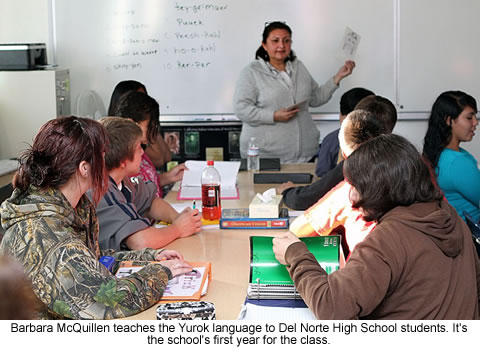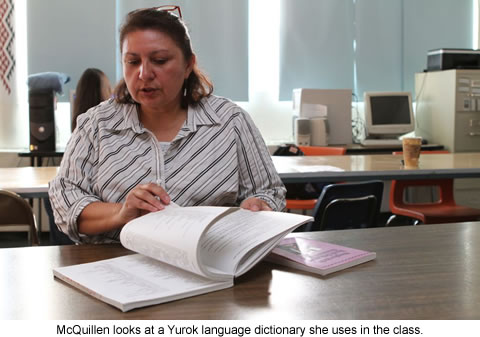 |
Canku Ota
|
 |
|
(Many Paths)
|
||
|
An Online Newsletter
Celebrating Native America
|
||
|
November 1, 2010 - Volume
8 Number 11
|
||
|
|
||
|
Back From The Brink:
Learning The Yurok Language
|
||
|
by Kelley Atherton,
The (Crescent City, CA) Triplicate
|
||
|
credits: photos by Bryant
Anderson - The Daily Triplicate
|
 NDN
students study language that was once nearly extinct NDN
students study language that was once nearly extinct
A class of 22 high school students is learning how to speak a language that nearly went extinct. It's estimated there are about 10 fluent speakers of Yurok, the native language of the tribe. This is the first year the language is being taught at Del Norte High School. "For years, we have been trying to get a class at Del Norte High School," said the instructor, Barbara McQuillen. Jim McQuillen, education director for the Yurok Tribe and brother to Barbara, used the words "historical" and "monumental" to describe the introduction of this class to DNHS. It was not long ago that Yuroks were taken from their homes and sent to boarding schools in an attempt to strip them of their language and culture, Jim McQuillen said. "We've come full circle," he said. "This lends a lot of hope to the cultural continuation of the Yurok people." He has waited many years to see Yurok offered at DNHS. As a parent, he is proud that at least his youngest child, a senior this year, will be able to take the class. Klamath River Early College of the Redwoods teaches Yurok, as do high schools in Humboldt County. Tolowa 1 and 2 have been taught at DNHS for many years. Yurok 2 is in line to start next fall. Being
engaged in school Six speakers in total have been recommended for a teaching credential, Jim McQuillen said, including his sister. The school district has wanted to offer Yurok language classes at the high school, said Superintendent Jan Moorehouse, but there were no credentialed teachers who could speak Yurok. The world is losing many of its indigenous languages, she said. Offering this class to high-schoolers will help efforts to preserve the language, but also show students that they can "have success in both worlds" of school and their culture. "We think this will help students who have a Yurok heritage to stay engaged with school," Moorehouse said. One student told Barbara McQuillen the first-period class is the reason he gets up and comes to school. Once approved — Jim McQuillen said this should happen any day now — Yurok will count toward the University of California's and California State University's world language prerequisites.
Students are learning basic vocabulary and how to introduce themselves, said Barbara McQuillen, a language teacher for the tribe. During a recent class, she explained to the students how to make Yurok words plural. "You don't make plurals in Yurok by adding a 'S,'" she said. "That's English." The class wrapped up that day's lesson with a vocabulary game. McQuillen held up flash cards and two students tried to be the first to say the correct Yurok word for the picture, such as "wenchokws" (woman) and "meweemor" (old man). The class also discusses Yurok culture. Students chose a Yurok name for themselves that is "culturally appropriate," McQuillen said. Students are learning how to say what they're feeling, such as "I'm hungry," as well as words for people, food and animals. McQuillen uses books, flash cards and other instructional materials from the Yurok Tribe Language Program in the class. The tribe and UC-Berkeley developed a dictionary that has Yurok to English and English to Yurok translations. The dictionary is available online where anyone can hear how the word is pronounced. "I'm also learning," McQuillen said. "I learn something new every day." Almost
a dead language "We proved that wrong," she said. Jim and Barbara McQuillen's grandmother was a native Yurok speaker, who like many Yuroks, she was forced from their homes to attend boarding schools. In these schools, Yuroks were forbidden to speak their language. That experience was the "most devastating to the language," Barbara McQuillen said. Those sent to the boarding schools came home afraid to speak the language, she said. When she was young, McQuillen said elders would speak in Yurok when they didn't want anyone to know what they were saying. Elders would say words or phrases when asked, but it took many years for them to be comfortable speaking Yurok again, she said. Members of that generation wanted their children to be able to speak and write English so they could be successful as adults, she said. Years ago, Yuroks had been tricked into giving land away because they didn't know English, McQuillen said, and they wanted to prevent that from happening again. "The tribe has been on an aggressive mission for the last 15 years to restore and revive our language," Jim McQuillen said. There are about 100 adults learning the language, he said, and many tribal members returning from college are interested in learning the language. "Restoring
our language" In 1999, she became a master apprentice in a program to keep Yurok alive and was paired with her mother to learn the language. At that time there were only about 15 speakers, she said. The tribe tried to record as many of their voices as possible, she said. Now, there are maybe only 10 fluent speakers, she said, and they are 80 or older. McQuillen said she stresses the small numbers of fluent speakers left to her students. "They have the opportunity to make sure the language doesn't die," she said. Jim McQuillen said the next goal is to offer Yurok language classes in middle school grades. "We're building the scaffolding for kids to learn it earlier," he said. Children enrolled in the tribe's Head Start program learn Yurok words. There are also evening classes in Crescent City, Klamath, Weitchpec and Arcata for anyone interested in learning Yurok. It's not reasonable to ask young people to also go to school in the evening, McQuillen said. That's why it was important to offer it in school. But the class is also "an opportunity for anyone to receive this enrichment," he said. The tribe would like to one day have Yurok language classes from pre-school to 12th grade, Barbara McQuillen said. "We're on our way to developing fluent speakers," she said. Being able to speak Yurok is something young people can take "out of the classroom and into the community," she said. Nowhere else but the North Coast can native and non-native people learn to speak Yurok, Jim McQuillen said. It took many years to get to the point where tribal members know the language and can teach it to other people, McQuillen said. That work has also prevented Yurok from being an endangered language. The Yurok 1 class "is a statement (DNHS) is willing to meet the needs of a diverse community," McQuillen said. "There are other cultures that are alive and well in the county." "It's just a reason to celebrate," he said. "Our hearts are soaring."
The
Yurok Tribe |
|
|
||
|
|
||
| Canku Ota is a free Newsletter celebrating Native America, its traditions and accomplishments . We do not provide subscriber or visitor names to anyone. Some articles presented in Canku Ota may contain copyright material. We have received appropriate permissions for republishing any articles. Material appearing here is distributed without profit or monetary gain to those who have expressed an interest. This is in accordance with Title 17 U.S.C. Section 107. | ||
|
Canku Ota is a copyright ©
2000, 2001, 2002, 2003, 2004, 2005, 2006, 2007, 2008, 2009, 2010
of Vicki Barry and Paul Barry.
|
||
 |
 |
|
|
The "Canku
Ota - A Newsletter Celebrating Native America" web site and
its design is the
|
||
|
Copyright ©
1999, 2000, 2001, 2002, 2003, 2004, 2005,
2006, 2007, 2008, 2009, 2010
of Paul C. Barry.
|
||
|
All Rights Reserved.
|
||
 Getting
the basics down
Getting
the basics down